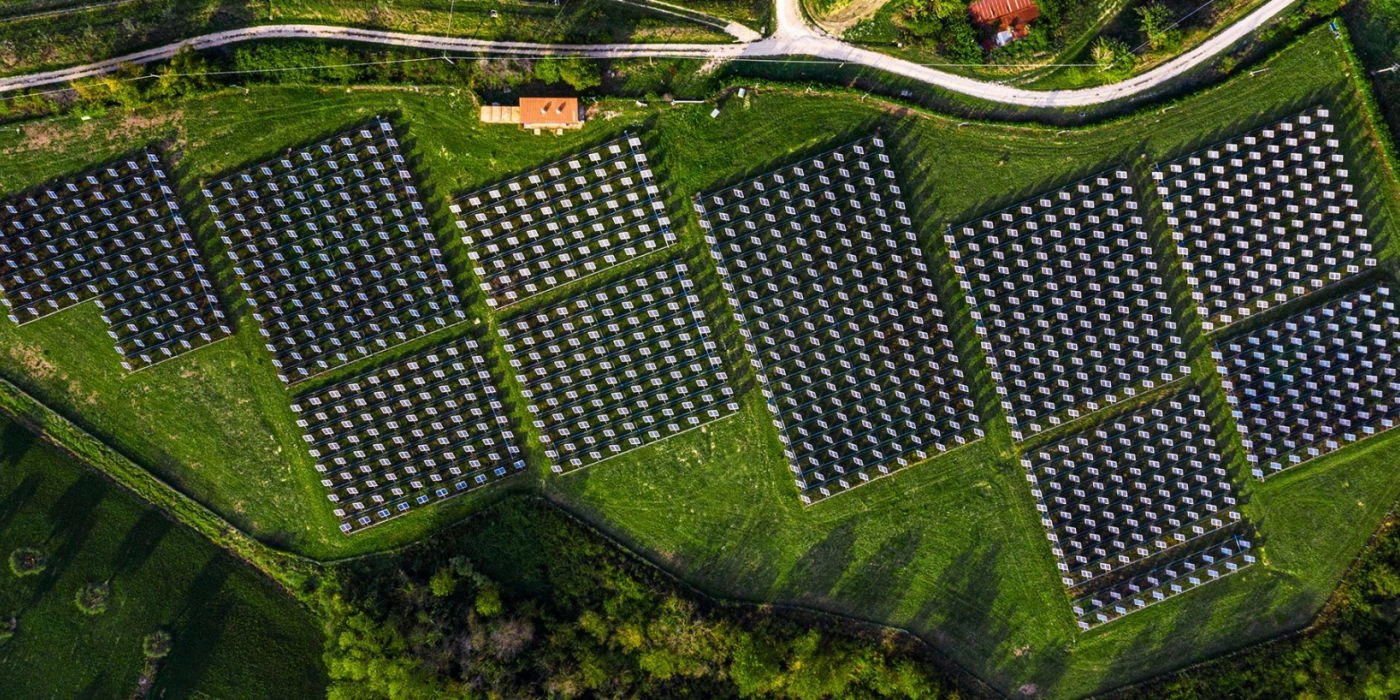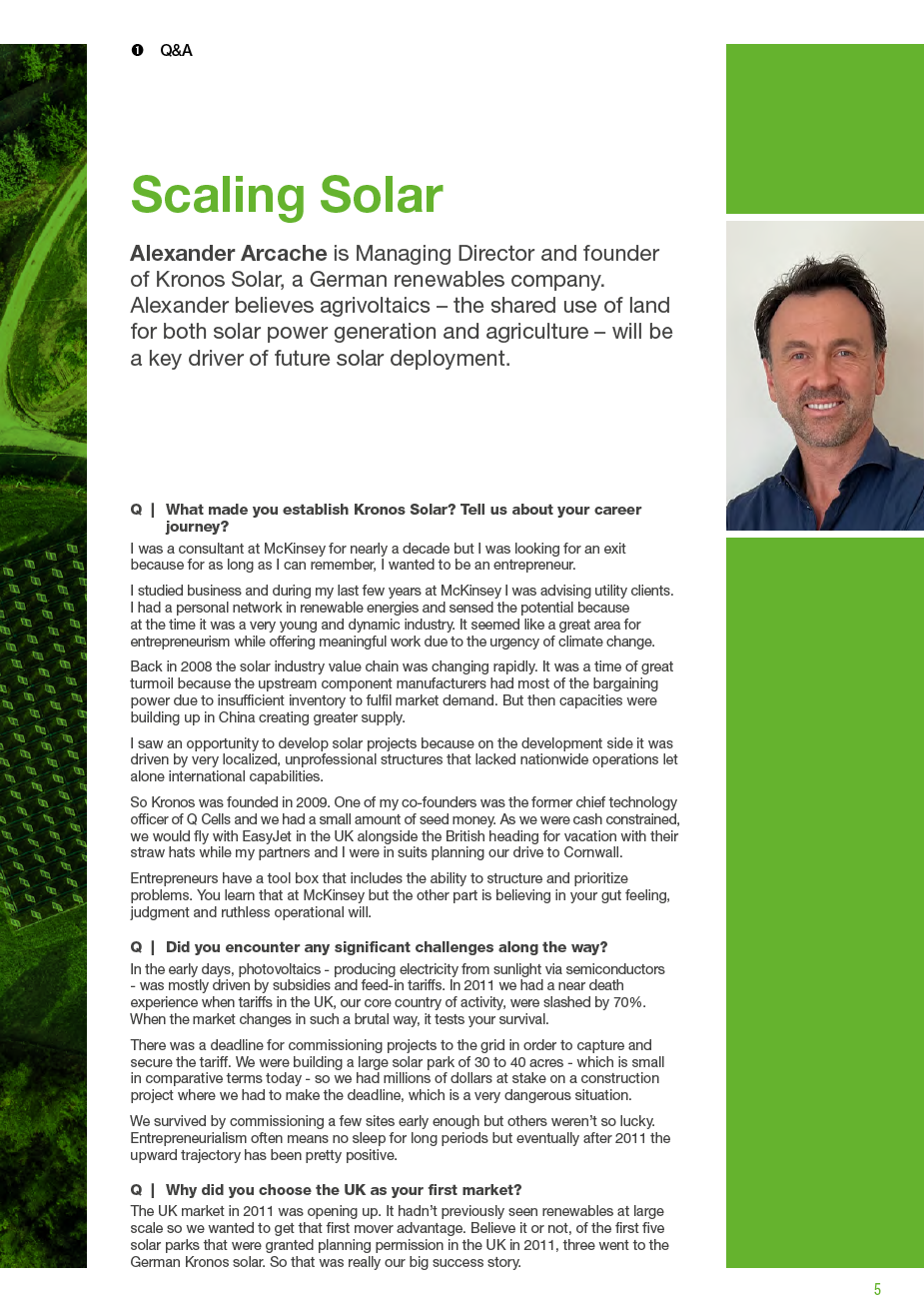-
Power generation through renewables needs to meet market demand while also being produced at a competitive market rate
-
The idea behind agrivoltaics can be very impactful but it needs to reflect the land value of the underlying soil
-
Efficiency in renewables needs to be distinguished into two different drivers - cost efficiency, in producing more power from a single cell, and technologically driven efficiency to improve the cells themselves
What made you establish Kronos Solar? Tell us about your career journey?
I was a consultant at McKinsey for nearly a decade but I was looking for an exit because for as long as I can remember, I wanted to be an entrepreneur.
I studied business and during my last few years at McKinsey I was advising utility clients. I had a personal network in renewable energies and sensed the potential because at the time it was a very young and dynamic industry. It seemed like a great area for entrepreneurism while offering meaningful work due to the urgency of climate change.
Back in 2008 the solar industry value chain was changing rapidly. It was a time of great turmoil because the upstream component manufacturers had most of the bargaining power due to insufficient inventory to fulfil market demand. But then capacities were building up in China creating greater supply.
I saw an opportunity to develop solar projects because on the development side it was driven by very localized, unprofessional structures that lacked nationwide operations let alone international capabilities.
So Kronos was founded in 2009.
Did you encounter any significant challenges along the way?
In the early days, photovoltaics - producing electricity from sunlight via semiconductors - was mostly driven by subsidies and feed-in tariffs. In 2011 we had a near death experience when tariffs in the UK, our core country of activity, were slashed by 70%. When the market changes in such a brutal way, it tests your survival.
There was a deadline for commissioning projects to the grid in order to capture and secure the tariff. We were building a large solar park of 30 to 40 acres - which is small in comparative terms today - so we had millions of dollars at stake on a construction project where we had to make the deadline, which is a very dangerous situation.
We survived by commissioning a few sites early enough but others weren’t so lucky. After 2011, the upward trajectory has been pretty positive.
Why did you choose the UK as your first market?
The UK market in 2011 was opening up. It hadn’t previously seen renewables at large scale so we wanted to get that first mover advantage. Believe it or not, of the first five solar parks that were granted planning permission in the UK in 2011, three went to the German Kronos solar. So that was really our big success story.
How worried are you about the speed of global warming?
The honest answer is I’m very worried for three main reasons.
Firstly, there’s a lack of global prioritization. Global warming remains pretty high on the agenda in most OECD countries and there’s determination via global meetings like COP27, yet when other matters become more pressing, we lose traction and support.
Secondly, there is a lack of operational control. We are capable of defining targets as a global society to map the journey yet even in our most developed democratic systems there’s a lack of power to translate targets into action.
Thirdly, the lack of continuous political leadership by the most important parties.
You recently sold a stake to EDP Renewables. What was the rationale? Is scale the most important factor in getting to net zero carbon emissions?
Scale matters greatly because it brings economies of scale and it isn’t realistic to be competitive with small structures.
It’s not the only lever but it’s a material one. And as Kronos and I want to achieve much more, it was a very logical combination to team up with one of the best players globally to become a leader in our core markets in the UK, Germany, France and The Netherlands.
What does being part of EDPR mean in practice for your goals?
It means that we can grow faster. We will have the ability to operate alongside the comprehensive downstream solar value chain – installation and financing – to hedge our risks. We can invest more and therefore deploy more renewables and larger solar parks across the group.
Renewables are hampered by intermittency. Does that mean we will always have to complement solar with energies like nuclear?
Renewable energies are not the only solution or a standalone solution but at the same time, if I look at the average cost of storing one kilowatt hour of renewables, it is decreasing significantly. And if we can take a similar cost curve development in battery storage that we have seen in solar - where today we can build a solar plant for 10% of the cost 15 years ago - then there’s a great journey ahead for renewables even without complimentary sources of energy from nuclear or gas fired power plants. Green energy combined with storage is very exciting.
And on top of this comes the question around green hydrogen. Together with EDPR we are looking at the entire solutions space; so energy storage, battery driven systems and green hydrogen may be part of the equation for us going forward.
Do you see Agrivoltaics as the future of solar?
There has been considerable talk about agriculture and solar production sharing space and in an ideal world they are not enemies but friends.
For example, where we have existing grazing by sheep, it’s mostly grass production so combining solar and sheep makes perfect sense. Where growing certain crops is required and that’s the most compelling factor we need to question whether adding solar is really worthwhile.
The fall in ‘learning rates’ over recent years means that energies like solar have become cheaper. Will that trend continue or do you foresee bumps in the road ahead?
For the time being I see a higher cost per kilowatt hour for solar energy amid a dramatic increase in component prices over the past 12 months.
Raw material prices have spiked and a solar power block consists of steel, glass and cable - all precious raw materials. So we are currently going through a bump but I expect that we will go back to more reasonable levels over the next 24 months and I hope that it doesn’t become a long bumpy ride.
Does that mean we’ve already extracted all the price efficiency over the past decade or so?
I expect cell efficiency to continue but at a slower pace than in the past. We are not expecting significant jumps in contrast to the efficiency that comes from economies of scale by building these solar modules cheaper via better raw material prices and a more productive setup of components.
This has been the core driver of the shift in total system efficiency over the last decade to a greater extent than efficiency from technological advancements.
So technology improvements are being offset by the current cost increase. These technological advancements are now more gradual and smaller in scale and therefore they cannot compensate for the cost increase
Disclaimer
This content has been prepared by Nomura solely for information purposes, and is not an offer to buy or sell or provide (as the case may be) or a solicitation of an offer to buy or sell or enter into any agreement with respect to any security, product, service (including but not limited to investment advisory services) or investment. The opinions expressed in the content do not constitute investment advice and independent advice should be sought where appropriate.The content contains general information only and does not take into account the individual objectives, financial situation or needs of a person. All information, opinions and estimates expressed in the content are current as of the date of publication, are subject to change without notice, and may become outdated over time. To the extent that any materials or investment services on or referred to in the content are construed to be regulated activities under the local laws of any jurisdiction and are made available to persons resident in such jurisdiction, they shall only be made available through appropriately licenced Nomura entities in that jurisdiction or otherwise through Nomura entities that are exempt from applicable licensing and regulatory requirements in that jurisdiction. For more information please go to https://www.nomuraholdings.com/policy/terms.html.





